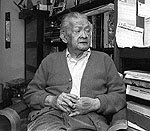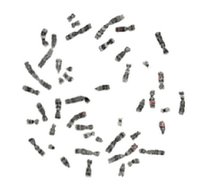Credit Where Credit is Due
 Geneticist Joe Hin Tjio was born on this day in 1919 in Java, Dutch East Indies to Chinese parents.
Geneticist Joe Hin Tjio was born on this day in 1919 in Java, Dutch East Indies to Chinese parents.Schooled in photography (informally, by his father) and agronomy (formally) in the Dutch East Indies, Tjio was imprisoned by the Japanese during World War II. After his release, he went to Europe on a fellowship and worked in plant breeding in Denmark and Sweden, then directed cytogenic research in Zaragoza, Spain, taking the summers to work with geneticist Albert Levan in Sweden.
 In Sweden he started to study human chromosomes and, while building on the techniques for separating chromosomes on glass slides introduced by T.C. Hsu, he discovered a more effective way of pressing human chromosomes flat for easier photography and analysis. The clarity of his results led to his discovery in 1956 that the number of diploid chromosomes in humans is 46, not 48 as had been previously thought. He and Levan quarreled over the credit for the results; according to Tjio, Levan had been away on holiday when Tjio made the discovery, and felt that Levan had added nothing to the analysis.
In Sweden he started to study human chromosomes and, while building on the techniques for separating chromosomes on glass slides introduced by T.C. Hsu, he discovered a more effective way of pressing human chromosomes flat for easier photography and analysis. The clarity of his results led to his discovery in 1956 that the number of diploid chromosomes in humans is 46, not 48 as had been previously thought. He and Levan quarreled over the credit for the results; according to Tjio, Levan had been away on holiday when Tjio made the discovery, and felt that Levan had added nothing to the analysis.The resulting paper eventually listed Tjio as first author after Tjio dared Levan to try to reproduce the results on his own -- although, since that time, the world seems bent on misspelling his name as "Tijo" when citing the paper.
Tjio moved to the U.S. the following year, working with Theodore Puck at the University of Colorado to obtain his Ph.D. before settling in at the National Institutes of Health, where he studied leukemia and mental retardation until his retirement in 1992. He died November 27, 2001 in Gaithersburg, Maryland.
Categories: Biologists-&-Physiologists





0 Comments:
Post a Comment
Subscribe to Post Comments [Atom]
<< Home